Maine Coon breeding
Exceptional Maine Coon Breeding Introduction
The Maine Coon, often called the "gentle giant," is an impressive breed of cat that has captured the hearts of many cat enthusiasts around the world. Originating from the state of Maine in the United States, this cat breed is known for its large size, luxurious coat, and affectionate personality. As one of the oldest natural breeds in North America, the Maine Coon has a rich and fascinating history that adds to its unique charm. These majestic cats are renowned for their intelligence, sociability, and gentle temperament, making them ideal family companions. We are a breeding center located in Île-de-France, and we have chosen to specialize in breeding Maine Coons, magnificent and majestic cats known for their great kindness – a cat-dog.
Striving to work with exceptional bloodlines and being relatively rare in France, we have focused on the following:
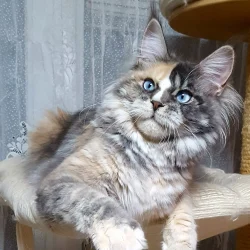
The Blue-Eyed Maine Coon
Typically, Maine Coons have green, gold, or amber eyes. However, for several years, stunning blue-eyed Maine Coons have been appearing. Intrigued, we decided to welcome our first blue-eyed red Maine Coon female. It should be noted that it is strictly forbidden to breed two blue-eyed Maine Coons together. Blue-eyed Maine Coons that are not white and do not possess a locket are not accepted by LOOF (Livre Officiel des Origines Félines). Therefore, our blue-eyed kittens will not have LOOF pedigrees. Blue-eyed Maine Coons do not have any specific health issues or vulnerabilities. They undergo the same tests as our other Maine Coons and are free from genetic diseases.
The Black Silver Shaded Maine Coon
Maine Coons can come in various colors, including black, blue, red, chocolate, and white. In our case, we have chosen to focus on the black base color. The next modifier can be silver/smoke, amber, golden, etc. Silver is not a color but a coat effect. In fact, "silver" means "silvered" in English. A silver-coated cat has a gene that prevents the synthesis of phaeomelanin, which is responsible for the yellow coloration at the base of solid-colored hairs. As a result, a silver-coated cat will have a white base for its fur instead of yellow, giving it a very bright appearance. Lastly, there are different coat patterns, such as shaded, shell, tabby, and ticked. Shaded and shell Maine Coons are particularly rare within these coat patterns.
A black silver shaded Maine Coon has a silver-white first half of its coat and the remaining half is black.
The face is adorned with unique and distinctive markings, specific to each cat. Their eyes tend towards green.
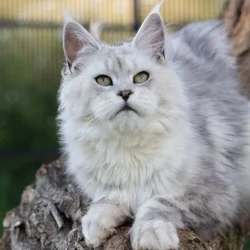
Maine Coon History
The Maine Coon is one of the largest cat breeds in the world, originating from the United States. The theories surrounding its creation remain mystical and fairy-like, sometimes suggesting that it arose naturally from crossbreeding between native short-haired cats and long-haired cats imported to America by early European settlers. One of the most popular legends suggests that they are descendants of cats owned by Queen Marie Antoinette, who allegedly sent her favorite cats to America during the French Revolution with the hope of joining them later.
Another romantic legend suggests that the Maine Coon is the result of a love story between a wild cat and a raccoon, although this is biologically impossible.
Despite the uncertainties surrounding their origin, one thing is certain: the Maine Coon is an authentically American breed that has conquered the world with its charm and pleasant personality. It is believed to have appeared in the 19th century and gained popularity in the 1990s. Today, the Maine Coon is the most registered breed in the LOOF (Livre des Origines Félines) in France. If you want to learn more about the history and origin of the Maine Coon, I recommend visiting the following website: L’histoire et l’origine du Maine Coon (mainecoonclub.fr)
Maine Coon temperament
The Maine Coon is an imposing and impressive cat, but it is also incredibly gentle and sweet. It is often described as a "gentle giant" due to its amiable and sociable nature.
These cats are extremely intelligent and curious, with a strong desire to explore their environment. They enjoy interacting with their owners and can even learn to respond to basic commands or play simple games. They are often referred to as "dog-like" cats because they are affectionate and love to follow their owners everywhere. They are curious cats that enjoy being the center of attention and participating in family life.
A very tactile cat, they will often come and sit on your lap and request cuddles. In fact, you will find it difficult to refuse them as they insist and know how to make themselves understood. They get along well with other animals, whether cats or dogs, of all sizes. Their sociable and curious nature drives them to interact and play with them. They are also adorable with children. They are very affectionate and clingy, which children usually enjoy. They prefer to flee in case of sudden movements rather than swat or scratch.
The Maine Coon is a highly intelligent cat capable of learning various tricks and understanding several words.
In terms of communication, Maine Coons have a distinctive meow, often described as chirping or trilling, which is typically used to attract attention or express contentment. They are talkative cats and use different tones of meowing and purring.
Finally, Maine Coons can live in both houses and apartments. However, it is essential to ensure that their environment is secure and free from danger. The garden should be secured to prevent the risks of roaming outside, and apartment windows should be equipped with protective measures. And one last piece of information: Maine Coons love water.
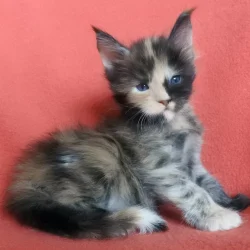
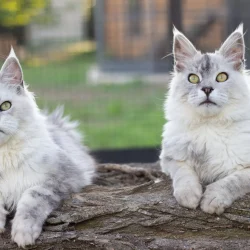
Maine Coon size - standard
The Maine Coon is a large-sized cat and is, in fact, one of the largest cats in the world. It is also a breed with a long growth period, reaching its full size around 3 to 4 years of age. It stands out for its impressive size, having a sturdy, muscular body, and a robust bone structure, making it one of the largest feline breeds in the world. Male Maine Coons usually weigh between 7 to 10kg at adulthood, with the largest ones reaching the higher end of the range. Female Maine Coons, on the other hand, typically weigh between 5 to 7kg on average. Shaded Maine Coons often have a smaller build compared to the more traditional-colored Maine Coons.
One of the most remarkable features of the Maine Coon is its beautiful semi-long coat. Their dense and water-resistant fur has adapted to survive the harsh winters of Maine. Their coat can come in a variety of colorsand patterns, ranging from solid to tabby, tortoiseshell, and bicolor. Maine Coons also have a thick, feather-shaped tail, tufted ears, and large expressive eyes that can be of different colors.
Males are often longer than females. The head is of medium size with a square muzzle and prominent cheekbones. The ears are large and set high on the head. Some Maine Coons have tufts on the top of their ears, resembling a Lynx. The Maine Coon should have a nice profile: the nose, lips, and chin point are aligned vertically.
Maine Coon Care
Although Maine Coons are generally a robust cat breed, they require specific care to stay healthy.
Their luxurious coat requires regular brushing to prevent knots and hairballs. It is recommended to brush them once a week.
Due to their large size, they need a balanced and high-quality diet to maintain optimal weight. We will discuss nutrition in more detail below.
Regular exercise is also essential for these active cats. It is important to provide them with an enriching environment with plenty of opportunities to play and explore. When we talk about an enriching environment, it is important to have items such as a cat tree, platforms of different heights, and hiding places. Cats love being at different heights.
Like all cats, regular visits to the veterinarian are essential to ensure their long-term health. These routine check-ups can help prevent, detect, and treat potential health problems before they become serious. It is recommended to have at least one annual visit to the veterinarian for vaccination boosters and a comprehensive check-up.
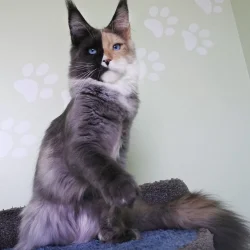
Maine Coon Nutrition
Cats are carnivores, and it is important to feed them a high-quality diet to ensure their health and well-being.
When it comes to a good-quality diet, there are two options:
- Provide good-quality dry food (kibble) along with wet food. Since cats tend to drink little, it is important to offer them a mixed diet.
- It is recommended to leave dry food available at all times. Wet food should be served in the morning and evening.
- Alternatively, you can opt for BARF (Biologically Appropriate Raw Food), which means feeding your feline raw, biologically appropriate food. We recommend two specialized BARF suppliers: Easy Barf for complete feline formula or St Laurent for the "Beef, Lamb, Poultry" mix.
BARF should be thawed in the refrigerator and given raw to your feline. It is convenient and does not require any special preparation. It is best to feed BARF 2 to 3 times a day and leave dry food available. However, one of the disadvantages is that you need to be very careful with its storage and hygiene. It is recommended not to keep thawed BARF in the refrigerator for more than three days and never leave BARF exposed to the air for several hours as it could make your cat sick. You can feed your cat using a free-feeding system, especially during the growth phase. Maine Coons and Savannahs are large felines with nutritional needs that must be met to ensure proper growth.
Maine Coon Health
Maine Coons are generally a robust breed with an average lifespan of 9 to 15 years.
However, like all cat breeds, Maine Coons can be predisposed to certain genetic conditions. One of the most common diseases in this breed is hypertrophic cardiomyopathy (HCM), a heart disease that can be detected through regular veterinary examinations.
Maine Coons may also be susceptible to certain kidney and joint diseases. For these reasons, it is essential to purchase kittens from responsible breeders who test their breeding cats for these conditions.
The parents of your future Maine Coon should be tested for the following genetic diseases:
- HCM: Hypertrophic cardiomyopathy is characterized by
thickening of the heart walls, leading to heart failure.
This condition only appears in adult cats and can cause lethargy and weight loss.
.
- PKD: Polycystic kidney disease is a condition that causes
cysts on the kidneys. It can result in
loss of appetite, weight loss, lethargy, and extreme thirst, and may lead to the death of the animal. PKDef: Pyruvate kinase deficiency is a deficiency of the enzyme pyruvate kinase, which plays a key role in red blood cell production. A deficiency in PKdef leads to the destruction of red blood cells, causing symptoms such as fatigue, shortness of breath, loss of appetite, and weight loss. SMA: Spinal muscular atrophy is a disease that affects and causes degeneration of the neurons that control the muscles. Symptoms typically appear at the age of 3 months, with muscle tremors in the hind legs. The cat may live for years but with significant disabilities that hinder proper movement and cause joint weakness.
Regular veterinary check-ups are also crucial to ensure the health and well-being of your Maine Coon throughout its life.
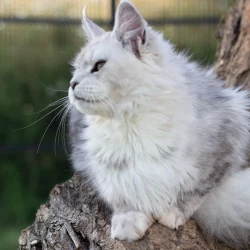
Education for Maine Coons
Maine Coons are stable, sociable, and confident cats. They learn quickly and are generally easy to train.
Thanks to their intelligence and natural curiosity, they can learn a variety of commands and tricks, such as coming when called, playing fetch, or even walking on a leash. Their natural curiosity makes them eager to participate in household life and be friendly within their new home.
Although they are generally well-balanced and sociable, each Maine Coon has its own personality, and some may develop behavior problems if they are stressed or unhappy. In any case, if you encounter difficulties with your Maine Coon, it is recommended to consult a professional animal behaviorist to obtain advice on how to manage these issues.
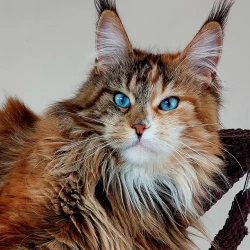
Male or Female Maine Coon?
There is no significant difference in behavior or character between male and female cats. Differences in character can occur within the same litter, but they are not related to the sex of the animal. A female is not necessarily gentler and more affectionate, and a male is not necessarily more aggressive. Male and female cats can be equally loving and affectionate. Moreover, you can greatly influence the character of your future kitten by spending time with it and fully integrating it into your family life.
Additionally, a neutered male, as well as a female, will not have behavioral problems such as marking territory. Also, dealing with a female cat in heat can be very challenging. The good news is that with spaying, you won't have this issue either. Finally, it should be emphasized that spaying/neutering is highly recommended for the health of your cat to prevent marking problems.
Price of a Maine Coon
Adopting a Maine Coon is an important decision that requires careful consideration. These cats have specific needs due to their large size, dense coat, and active nature, and they require long-term commitment in terms of time, energy, and financial resources.
When considering adopting a Maine Coon, it is crucial to choose a responsible breeder who prioritizes the health and well-being of their cats.
A good breeder will conduct genetic tests to eliminate common health issues in the breed and will raise the kittens in a clean and loving environment to ensure their social and emotional development.
Furthermore, a good breeder will always be ready to answer your questions and provide advice and support throughout your cat's life. The Maine Coon is an exceptional cat, and we have chosen to work with prestigious and still very rare lines in France, whether it's blue-eyed Maine Coons or Shaded Maine Coons.
All our kittens are raised with love and attention in a family environment. Therefore, we expect the same from our adopters. We carefully select our future adopters to ensure that our little ones will go to the best possible families.
All our kittens leave the cattery with:
- Microchip identification
- Vaccinations
- Health record
- Internal and external parasite treatment
- Certificate of good health
- Registered with LOOF (when possible)
- Spayed/neutered for pet homes
- Reservation contract, sales contract, and invoice
- 3-month health insurance with Santévet
- Commitment and knowledge certificate
- Kitten starter kit
- Information packet with parent tests and pedigree for kittens that cannot be registered with LOOF
To reserve a kitten, we require a deposit of 30% of the kitten's price.
Prices for pets: 1500 to 2500 euros
Prices for companion kittens (high smoke, silver shaded, chinchilla): 2500 to 4000 euros
Prices for companion kittens with blue eyes: 3000 to 4000 euros
For inquiries about breeding kittens, please contact us to present your project. We will only sell for breeding purposes to professionals with a SIREN and ACACED number. Our prices for breeding vary from 4000 to 8000 euros.